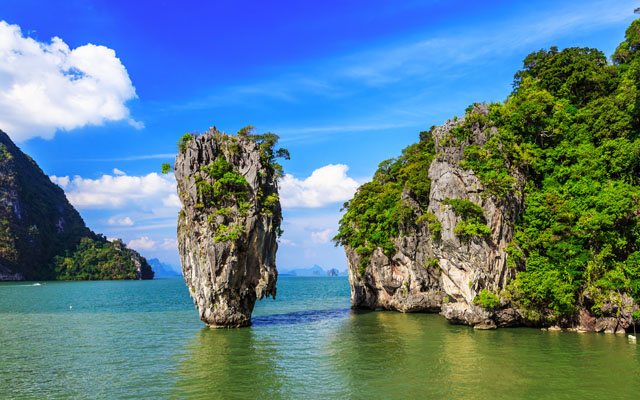
European travellers are proving to be the biggest driver of tourism in southern Thailand, boosting hotel business to record levels with their multi-week stays.
Tourists from Russia, Scandinavia and Germany, attracted by the area’s natural beauty, are the main drivers of occupancy rates of over 90 percent, the Bangkok Post reported.
 Southern Thailand is seeing an influx of European tourists. Pictured is James Bond Island in Phang Nga Bay.
Southern Thailand is seeing an influx of European tourists. Pictured is James Bond Island in Phang Nga Bay.
Pongsakorn Ketprapakorn, former president of the Phang Nga Tourism Association, said “Many hotels in the province, especially in Khao Lak, are charging high room rates of 6,000 baht (US$168.50) to 10,000 baht a night, up from an average of 5,000 baht in 2019.”
Ketprakorn explained that despite a surge in Chinese tourists – who will account for about a fifth of all tourists in 2023 – Phang Nga province hasn’t really been able to tap into a consumer base attracted to beach holidays and urban entertainment, with the tourism sector contributing just 5-10 percent to the province’s economy.
Krabi hotels are also benefiting from longer-term European arrivals.
Charinthip Thiyaporn, owner of Pimalai Resort & Spa on Krabi’s Koh Lanta, told media that Chinese tourists were unable to get rooms over the Chinese New Year holiday because 90% of the rooms were booked by Europeans who booked 180 days in advance, outnumbering Chinese guests who tend to book closer to the travel season.
Strong advance demand has allowed Pimalai Resort and Spa to increase rates to over 900 baht for all accommodation types.
The Thai government has eagerly embraced China as a key sending market in its ambitious plans to bolster the kingdom’s tourism industry, but local tourism officials believe a lack of flights and southern Thailand’s reputation as a tourist destination could be dampening the potential for an increase in Chinese tourists.
A spokesman for the Krabi Tourism Association said there was a lack of direct flights from China to Krabi – before the COVID-19 outbreak, the region had flights from five Chinese cities.
Freelance travel agent Lek Nawat told TTG Asia that Chinese travellers are still drawn to “established destinations like Bangkok, Pattaya and Phuket” where they “feel safer and more confident moving around”.
She explained: “Chinese tourists are still quite cautious when it comes to travelling. Lesser known destinations raise a lot of questions: what to do, what to eat, health and safety, whether digital payments can be used, etc. Never underestimate the importance of WeChat. There is also a lack of demand to visit off the beaten path places.”

